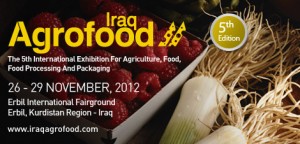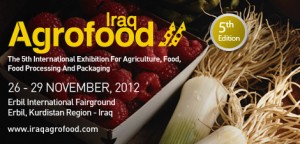Is Iraq ready for albariño?
October 26th, 2012 | Wine Fairs
 Do the Agriculture and Food & Beverages sectors in Iraq represent a strategic market for your organization? This is the question raised by a recent e-mail. To be brutally honest I have to say that in this instance my answer would probably have to be an emphatic “no”!
Do the Agriculture and Food & Beverages sectors in Iraq represent a strategic market for your organization? This is the question raised by a recent e-mail. To be brutally honest I have to say that in this instance my answer would probably have to be an emphatic “no”!
We regularly get invited to food and wine fairs around the world, some in the Middle East, others on the African continent, where they are often described as ’emerging markets’. Of course we would like to support some of these countries as they struggle to find new economic growth, but are they really ready for albariño?….. I think not.
Even in more established wine drinking markets albariño does not exactly fly off the shelves, indeed, I often describe it as a ‘hand-sale’, as would be consumers really have to be steered towards our slightly obscure grape variety. Having said that, the beauty of our humble grape is that once these new consumers are hooked, then they will usually come back for more. It’s the first sale that is always the tough one.
In the case of these emerging markets, that are just discovering wine consumption for the first time, then we find ourselves very much at the back of the queue. The charge is often led by the French, especially the more famous wine growing regions such as Bordeaux and Burgundy. As the demand grows these new students of wine might experiment with a few other wine regions, and might even venture outside the borders of France, into maybe Italy, Chile or Australia (depending on their budget). Perhaps only then is Spain discovered as a wine producer, and then usually with a bit of Rioja or Ribero del Duero – the key point being that new drinkers nearly always start with red wine. (Perhaps they have heard that red wine, in moderation, can be good for your health?).
The other slight problem is that Spain is not really renowned for its white wine, and so anybody searching for a new experience might well start with one of the better known noble grape varieties such as chardonnay or sauvignon blanc (albariño coming well down the list of possible alternatives). It’s really for this reason that in the first instance we chose to divert our energies toward the more mature wine drinking nations.
Iraq? I think we will leave it to the French to break the ice first.
 Do the Agriculture and Food & Beverages sectors in Iraq represent a strategic market for your organization? This is the question raised by a recent e-mail. To be brutally honest I have to say that in this instance my answer would probably have to be an emphatic “no”!
Do the Agriculture and Food & Beverages sectors in Iraq represent a strategic market for your organization? This is the question raised by a recent e-mail. To be brutally honest I have to say that in this instance my answer would probably have to be an emphatic “no”!
We regularly get invited to food and wine fairs around the world, some in the Middle East, others on the African continent, where they are often described as ’emerging markets’. Of course we would like to support some of these countries as they struggle to find new economic growth, but are they really ready for albariño?….. I think not.
Even in more established wine drinking markets albariño does not exactly fly off the shelves, indeed, I often describe it as a ‘hand-sale’, as would be consumers really have to be steered towards our slightly obscure grape variety. Having said that, the beauty of our humble grape is that once these new consumers are hooked, then they will usually come back for more. It’s the first sale that is always the tough one.
In the case of these emerging markets, that are just discovering wine consumption for the first time, then we find ourselves very much at the back of the queue. The charge is often led by the French, especially the more famous wine growing regions such as Bordeaux and Burgundy. As the demand grows these new students of wine might experiment with a few other wine regions, and might even venture outside the borders of France, into maybe Italy, Chile or Australia (depending on their budget). Perhaps only then is Spain discovered as a wine producer, and then usually with a bit of Rioja or Ribero del Duero – the key point being that new drinkers nearly always start with red wine. (Perhaps they have heard that red wine, in moderation, can be good for your health?).
The other slight problem is that Spain is not really renowned for its white wine, and so anybody searching for a new experience might well start with one of the better known noble grape varieties such as chardonnay or sauvignon blanc (albariño coming well down the list of possible alternatives). It’s really for this reason that in the first instance we chose to divert our energies toward the more mature wine drinking nations.
Iraq? I think we will leave it to the French to break the ice first.


